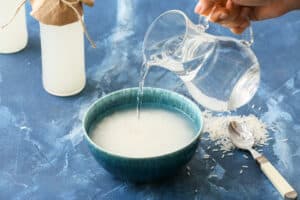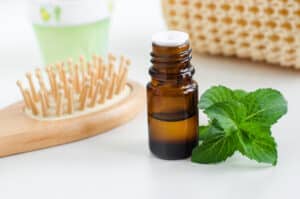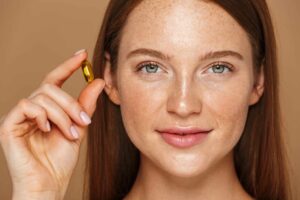The human body needs several B vitamins to function properly. Here are the most important ones for hair health:
Thiamin (Vitamin B1)
Thiamin is one of the B vitamins that helps many bodily functions like energy production, nerve function, and even hair and scalp health. Studies have shown that thiamin contributes to the proliferation of epidermal keratinocytes, which impact hair follicle growth. You can find thiamin in common foods such as meats and grains.
Thiamin deficiencies can lead to issues with the scalp’s skin and can directly contribute to hair loss. A lack of this vital nutrient can also negatively impact blood sugar regulation, which in turn can impact hair follicle health.
Riboflavin (Vitamin B2)
As one of the B vitamins, riboflavin is essential for numerous bodily functions like energy production and red blood cell formation. You can find it in common foods such as milk, cheese, eggs, and green veggies. Riboflavin is important for keeping hair healthy. Studies have shown that deficiency in b vitamins like riboflavin can lead to hair loss.
Niacin (Vitamin B3)
Niacin is important for hair growth because it has been shown to prevent oxidative stress on hair follicle cells. Nacin also helps to produce energy and fatty acids, both of which are necessary for healthy hair. A niacin deficiency can lead to a condition called Pellagra, which causes skin lesions, diarrhea, and dementia.
Pantothenic Acid (Vitamin B5)
Pantothenic acid is an important water soluble B vitamin that has been shown to to encourage healthy hair growth. It can be found in many foods and helps to maintain the health of the scalp and produce keratin, the protein that makes up hair shafts.
Vitamin B6
Vitamin B6 is often added to multivitamins marketing to support hair growth because it encourages cell generation and scalp health, both of which are important for strong hair. Vitamin B6 can be found in nutrient-rich foods such as poultry, fish, whole grains, and bananas.
Biotin (Vitamin B7)
Biotin (vitamin B7), is a water-soluble B vitamin that does wonders for the hair, skin, and nails. You can find biotin in lots of foods like eggs, milk, salmon and avocados among others.
Although rare, a biotin deficiency can lead to a number of health problems. Hair loss is one of the most common symptoms biotin deficiency, which can affect both genders. However, other side effects may include brittle nails, dry skin, and rashes.
There are many biotin supplements on the market in various forms, such as topical serums and oral pills. Although advertised as hair growth products, there is no scientific proof that topical biotin works to treat hair loss. Nevertheless, taking oral biotin supplements could improve noticeable differences for some people with hair loss issues.
Folate (Vitamin B9) and Folic Acid
Folic acid is the precursor to folate (vitamin B9) and it is often added to enriched foods and supplements. It can be found in leafy green vegetables, legumes, nuts, and other food items. Folic acid helps the body create new cells and properly develop the nervous system. Additionally, deficiencies in folates have been linked to hair loss.
Vitamin B12
Vitamin B12 is essential for hair growth as it aids in cell reproduction. Furthermore, a healthy scalp is crucial if you want to stimulate hair growth, and vitamin B12 can help to maintain a healthy scalp. Some foods that are rich in vitamin B12 include poultry, fish, whole grains, and bananas. It is also found in many over-the-counter hair vitamins.
Vitamin B12 deficiencies are somewhat rare, although they can be more common in people on vegan diets. A vitamin b12 deficiency can cause numerous health issues. One of the most frequent symptoms is hair loss in both genders. Additionally, brittle nails, dry skin, and skin rashes may occur.











